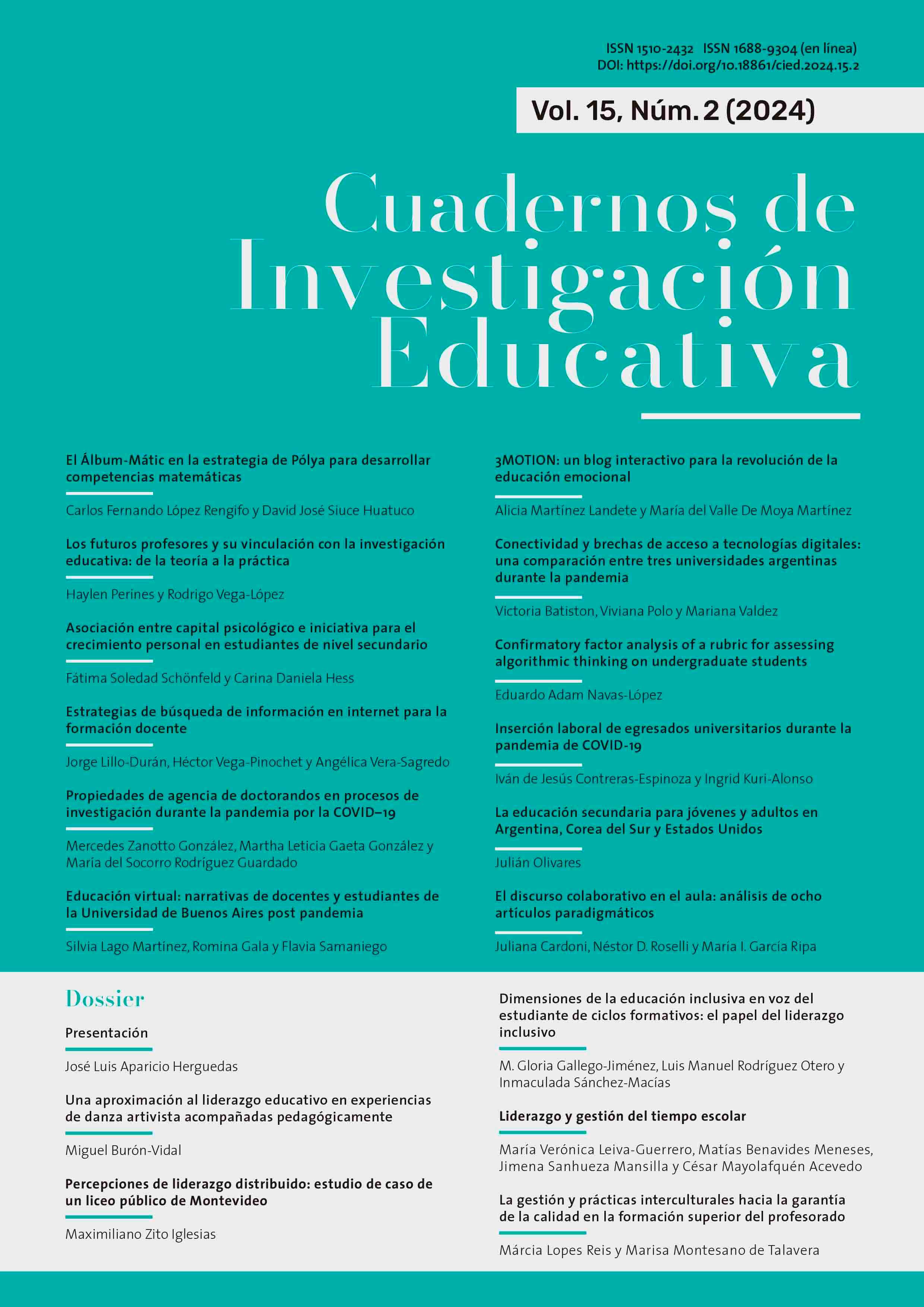Educational research training of prospective teachers: from theory to practice
DOI:
https://doi.org/10.18861/cied.2024.15.2.3723Keywords:
higher education, teacher, pedagogy, investigation, training, formative researchAbstract
The relevance of educational research in teacher training is a line of research that is part of the international debate. In the Ibero-American context, it has been gaining notoriety in recent years. The present work has a double objective. The first is to carry out an experience where some aspects of training in educational research are applied based on a theoretical model. The second is to know the students' evaluations of the formative actions carried out during the experience and the relevance of educational research for teaching. In order to achieve the proposed objectives, we implemented three formative actions with pre-service teachers at a public university in Chile. Later, we collected data through focal groups. (4). The results show that students favorably value using educational research to access updated information on various educational aspects, strengthen professional decision-making, and update teaching knowledge. Among the conclusions, the importance of continuing to implement concrete actions within the training programs so that students have a timely approach to educational research is highlighted.
Downloads
References
Brown, C., MacGregor, S., Flood, J., & Malin, J. (2022). Facilitating Research-Informed Educational Practice for Inclusion. Survey Findings From 147 Teachers and School Leaders in England. Frontiers in Education, 7. https://doi.org/10.3389/feduc.2022.890832
Cabrera Borges, A., Rebollo, C., & Rodríguez, M. (2021). Desarrollo de estrategias investigativas a través de un diseño de investigación acción. Revista Electrónica Sobre Cuerpos Académicos y Grupos de Investigación, 8(16).
Corbin, J., & Strauss, A. (2008). Basics of qualitative research: Techniques and procedures for developing grounded theory (3rd ed.). Sage Publications. https://doi.org/10.4135/9781452230153
Damşa, C. (2018). Research and Development Tasks in Teacher Education: Institutional Framing and Student Experiences. En P. Maassen, M. Nerland & L. Yates (Eds.), Reconfiguring Knowledge in Higher Education, (pp. 149-167). Springer.
Espinoza Freire, E. E. (2020). La investigación formativa. Una reflexión teórica. Conrado, 16(74), 45-53.
Galindo-Domínguez, H., Perines, H., Verde Trabada, A., & Valero Esteban, J. M. (2022). Understanding the pedagogical gap between the educational research and the reality of teachers: an analisis of the difficulties and proposals. Educación XX1, 25(2), 173-200. https://doi.org/10.5944/educxx1.29877
Glaser, B. G. (1992). Basics of grounded theory analysis. Sociology Press.
Griffioen, D. M. (2019). The influence of undergraduate students’ research attitudes on their intentions for research usage in their future professional practice. Innovations in Education and Teaching International, 56(2), 162-172. https://doi.org/10.1080/14703297.2018.1425152
Huber, C. R., & Kuncel, N. R. (2016). Does College Teach Critical Thinking? A Meta-Analysis. Review of Educational Research, 86(2), 431-468. https://doi.org/10.3102/0034654315605917
Imbert Romero, D., Pérez Salatto, M., Rodríguez Infanzón, M. E., Nieto Vásquez, S., & Rebollo Kellemberger, M. C. (2022). Investigación Formativa y desarrollo de Estrategias Investigativas. Revista F@ro, 1(35), 57-70.
Lara-Subiabre, B. A., & Castillo-Mardones, P. (2020). Valoración de una experiencia formativa de indagación desde la mirada de la identidad docente. Perspectivas Docentes, 31(74), 9-20. https://doi.org/10.19136/pd.a31n74.3856
Larenas, C. H. D., Rodríguez, M. I. S., Hernández, V. S., Solar, M. C., & Morales, J. V. (2015). Temas Clave en la Formación de Profesores en Chile desde la Perspectiva de Docentes y Directivos. Revista Complutense de Educación, 26(3). https://doi.org/10.5209/rev_rced.2015.v26.n3.44300
McCartney, E., Marwick, H., Hendry G., & Ferguson, E.C. (2018) Eliciting student teacher’s views on educational research to support practice in the modern diverse classroom: a workshop approach, Higher Education Pedagogies, 3(1), 342-372, https://doi.org/10.1080/23752696.2018.1498748
Ministerio de Educación, Gobierno de Chile (2022a). Estándares de la profesión docente carreras de Pedagogía en Lenguaje Educación Media. Centro de Perfeccionamiento, Experimentación e Investigaciones Pedagógicas CPEIP.
Ministerio de Educación, Gobierno de Chile (2022b). Estándares de la profesión docente Educación General Básica. Centro de Perfeccionamiento, Experimentación e Investigaciones Pedagógicas CPEIP.
Moreno, M. G. (2005). Potenciar la educación. Un currículum transversal de formación para la investigación. REICE. Revista Iberoamericana sobre Calidad, Eficacia y Cambio en Educación, 3(1), 520-540.
Perines, H. (2017). Las murallas invisibles entre la investigación educativas y los docentes. Ciencia y Educación, 1(1), 11-21. https://doi.org/10.22206/CYED.2017.V1I1.PP11-21
Perines, H. (2018). ¿Por qué la investigación educativa no impacta en la práctica docente? Estudios sobre Educación, 34, 9-27. https://doi.org/10.15581/004.34.9-27
Perines, H. (2020). El camino hacia un modelo formativo en investigación educativa al interior de las carreras de pedagogía. Revista de Estudios y Experiencias en educación, 19(41), 241-256. http://dx.doi.org/10.21703/rexe.20201941perines13
Perines, H., & Hidalgo, N. (2020). ¿Qué valoraciones tienen los futuros profesores sobre la investigación educativa? Validación del Cuestionario de Actitudes de Investigación en Educación Vocacional. En Primer Congreso Caribeño de Educación (pp. 267-274). Instituto Superior de Formación Salomé Ureña, Santo Domingo, República Dominicana.
Perines, H., & Murillo, J. (2017). Percepciones de los docentes en formación sobre la investigación educativa. Estudios pedagógicos (Valdivia), 43(1), 251-268. http://dx.doi.org/10.4067/S0718-07052017000100015
Prendergast, S., & Rickinson, M. (2019). Understanding school engagement in and with research. The Australian Educational Researcher, 46, 17–39. https://doi.org/10.1007/s13384-018-0292-9
Restrepo, B. (2003). Investigación formativa e investigación productiva de conocimiento en la universidad. Nómadas (Col), (18), 195-202.
Reyes Rodríguez, A. D. (2022). Asesoría metodológica en trabajos finales de carrera en Educación. Una experiencia en pregrado. Márgenes Revista de Educación de la Universidad de Málaga, 3(1), 115-133. http://dx.doi.org/10.24310/mgnmar.v3i1.12342
Sabariego Puig, M., Cano Hila, A. B., Gros Salvat, B., & Piqué Simón, B. (2020). Competencia investigadora e investigación formativa en la formación inicial del docente. Contextos Educativos, (26), 239–259. https://doi.org/10.18172/con.4326
Taylor, M. (2013). Social science teachers’ utilization of best evidence synthesis research. New Zealand Journal of Educational Studies, 48(2), 34.
van Katwijk, L., Berry, A., Jansen, E., & van Veen, K. (2019). “It's important, but I'm not going to keep doing it!”: Perceived purposes, learning outcomes, and value of pre-service teacher research among educators and pre-service teachers. Teaching and Teacher Education, 86, 102868. https://doi.org/10.1016/j.tate.2019.06.022.
van Schaik, P., Volman, M., Admiraal, W., & Schenke, W. (2018). Barriers and conditions for teachers’ utilisation of academic knowledge. International Journal of Educational Research, 86, 50-63. https://doi.org/10.1016/j.ijer.2018.05.003
Vanderlinde, R., & van Braak, J. (2010). The gap between educational research and practice: Views of teachers, school leaders, intermediaries and researchers. British Educational Research Journal, 3(2), 299-316. https://doi.org/10.1080/01411920902919257






